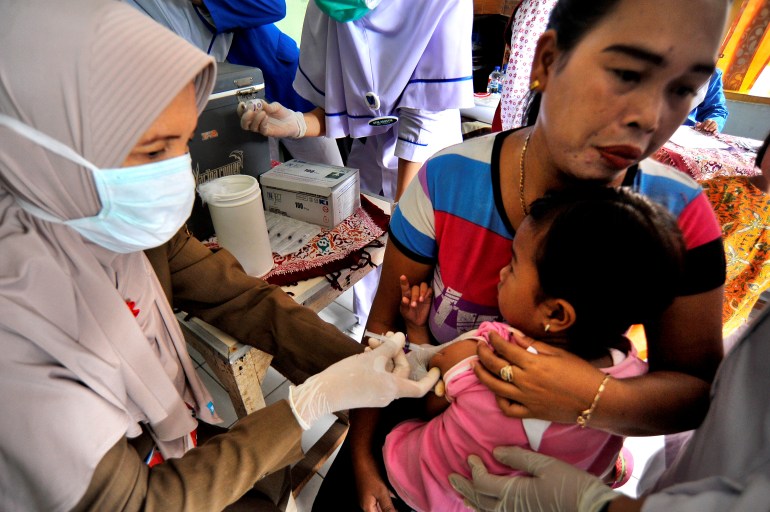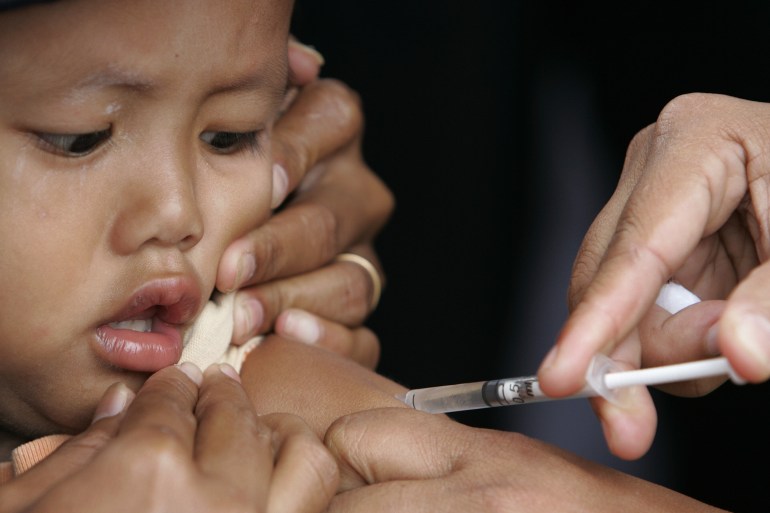COVID turmoil disrupts routine vaccinations in Indonesia
Experts warn country faces rise in infectious disease even as it struggles to contain the coronavirus pandemic.

Before the pandemic, Mamik Nariati’s five grandchildren were given free immunisations for diseases like polio, mumps and Hepatitis B at their school in the city of Surabaya in East Java.
“But since the online school started last year, there is no more immunisation programme,” she told Al Jazeera.
Keep reading
list of 4 itemsBali hit by ‘oxygen crisis’ as Indonesia’s COVID struggles rise
Indonesia’s raging pandemic offers fertile ground for variants
‘It cannot be contained’: Indonesia COVID deaths go unreported
Sarigita Andika Wati, a mother of three in the Balinese regency of Tabanan, has a similar story: “My kids can’t go to school so they couldn’t get the free immunisations.”
The youngsters are among 800,000 Indonesian children who missed out on routine vaccinations last year due to pandemic service disruptions – a jump of 40 percent compared with the previous year – according to data compiled by the World Health Organization (WHO) and UNICEF.
It is another blow for Indonesia, which has now surpassed India and Brazil to become the world’s newest coronavirus hotspot. On Monday, with overwhelmed hospitals struggling to treat the sick, the death toll reached a record 1,338 on Monday.
The COVID-19 infection rate for children in Indonesia is also among the highest in the world, accounting for one in eight or 362,000 confirmed cases, according to the Indonesian Paediatric Society. More than 700 Indonesian children have died from the virus, half of them under the age of five. Without their routine childhood shots they are also at risk from some of the world’s most virulent diseases.
“It is true that there was a drop in routine immunisation for kids from March to December last year because kids don’t go to school, public places and hospitals, so the coverage was low,” said Dr Siska Sinardja, a spokeswoman for the Indonesian Pediatrician Association, told Al Jazeera. “The effect of the delay on the immunisation of children will be an increase in infectious diseases. But no data is available on this yet because the COVID rate is still increasing and all the focus is on fighting COVID in Indonesia.”
Forfeiting gains
Vaccine programmes in developing countries have prevented 37 million deaths in developing countries around the world in the past 20 years, according to the Vaccine Impact Modelling Consortium, a global collaboration of 16 research groups that published the most comprehensive study on the effect of vaccination programmes yet undertaken in the Lancet journal in January.
“The magnitude of this cannot be underestimated. As a result of simple vaccinations, 36 million families were not left grieving for their child or baby – and these children were given the chance to grow up,” said Professor Neil Ferguson at Imperial College London’s School of Health, a spokesman for the consortium. The consortium also estimated a further 32 million deaths could be prevented by 2030 if vaccine programmes continued.

But disruptions to vaccination programmes worldwide as a result of the pandemic mean it is unlikely the target will be reached.
The WHO/UNICEF data shows global coverage of routine childhood vaccines dropped from 86 per cent in 2019 to 83 per cent last year – and that 3.7 million more children missed out on their general vaccines, the highest number since 2009.
Asia accounts for two-thirds of all the additional children who missed out on their shots last year, with the remaining third spread through Africa and South America.
India and Pakistan, where more than two million children did not receive the first dose of diphtheria-tetanus-pertussis combined vaccine last year, top the list. But the problem is more pronounced in Indonesia, which boasted the world’s largest vaccination campaign before the COVID-19 pandemic struck.
Between 2017 and 2018, approximately 70 million Indonesian school children were jabbed with a combined measles-rubella vaccine from India. As a result, measles and rubella cases dropped by more than 90 percent. But now a good chunk of that gain – along with broader improvements in education and development engendered by vaccines – are being lost.
“Even as countries clamour to get their hands on COVID-19 vaccines, we have gone backwards on other vaccinations, leaving children at risk from devastating but preventable diseases,” said WHO Director-General Tedros Adhanom Ghebreyesus. “Multiple disease outbreaks would be catastrophic for communities and health systems already battling COVID-19.”
Legacy of COVID-19
Indonesia’s health ministry has been trying to rectify the problem.
Prima Yosephine, a director of surveillance and quarantine at the ministry, acknowledged that the pandemic affected routine childhood vaccinations programmes last year because “no alternative had been put in place and people were afraid to take their children to public places”.
But she told Al Jazeera that at the end of last year, the ministry issued a communique for parents to make appointments [for childhood vaccinations] at “puskesmas”, a national network of more than 10,000 free health clinics in Indonesia and avoid the crowds.
To mark World Immunisation Week in April, the ministry also introduced multi-injection appointments at puskesmas for children to play catch up.
“So while the vaccinations were delayed, children still received their complete vaccines,” Yosephine said.

Mother of three Sarigita Andika Wati confirms she was able to immunise all three of her children this year after presenting her National Health Insurance card at a puskesmas in Bali.
But only 81 per cent of Indonesians are participants in the National Health Insurance programme, while Mamik Nariati in Surabaya, a city of four million people, says vaccines for her twin two-year-old grandchildren are not available at her local puskesmas.
Yosephine attributed such shortfalls to staff at puskesmas being overloaded with work due to the high number of cases of COVID-19.
Sources in Java confirmed to Al Jazeera that thousands of puskesmas on the island had been converted into isolation wards and temporary morgues.
Gavi, the Vaccine Alliance that is sourcing billions of free COVID-19 vaccines for developing countries, says countries like Indonesia that have been hit hardest by the pandemic will need help to plug the gaps in children’s routine immunisations.
“This is a wake-up call – we cannot allow a legacy of COVID-19 to be the resurgence of measles, polio and other killers,” said Dr Seth Berkley, Gavi’s chief executive. “The future health and wellbeing of millions of children and their communities across the globe depend on it.”